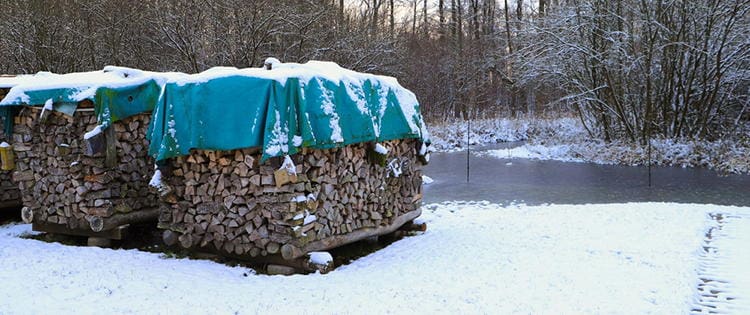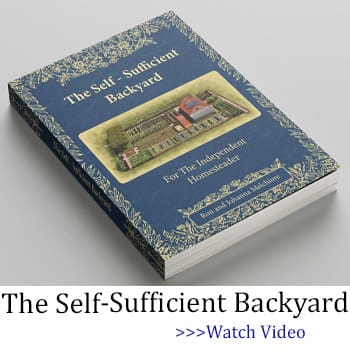As winter approaches, it’s a good time to prepare ourselves for the cold, just as our pioneers did.
Don’t worry, I’m not suggesting you to give up modern conveniences and head into the wilderness. Instead, I’ll share a few practical tips and tricks to help you make the most of your homestead during harsh winters.
I’ve always been fascinated by how our pioneers thrived on their farmsteads despite the severe cold, all without the modern technology and innovations we have today. After speaking with the experienced senior homesteaders in my family, I learned that surviving winter on a homestead becomes much easier when you have adequate knowledge about the right strategies.
Below, I’ve compiled a list of those 11 tried-and-tested methods our pioneers used to endure harsh winters. And the best part? Many of these tricks are so simple that we’ve been using them without even realizing it for generations!
These are the easiest and quickest strategies to survive harsh winters. These time-tested techniques have been passed down through generations and continue to be valuable even in today’s modern world.
Building Insulated Shelters
Now, you might wonder how pioneers insulated their homes when they had little to no supply of materials. So, basically, the people from the past used to make their homes warm using moss, straw, or animal hides. They simply had these materials installed in between or outside the walls of their houses to make the indoor temperature bearable.
Nowadays, there are many innovative techniques available to insulate your home. However, if you aren’t a fan of huge renovation projects just like me, you can rely on recycled materials like denim, cellulose, and wool. For this purpose, get in touch with a contractor, or you can arrange a mini DIY project to get your home insulated.
Related: You Are Not Ready For Winter Until You Have These
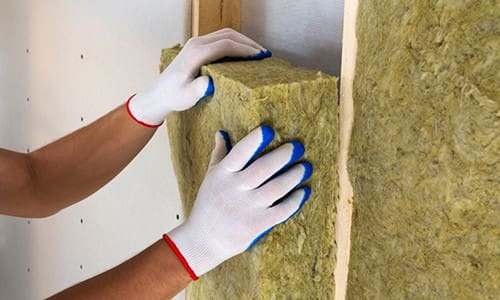
Stockpiling Dry Food
In the past, snow often made it tough to harvest crops, leading to a shortage of fresh food. But our pioneers devised a simple fix for this: they saved a part of their harvest, especially for the winters when food got scarce.
In addition, our ancestors also sun-dried fruits to keep them fresh for longer so they could enjoy them during the cold season. Taking a cue from their wisdom, I started setting aside a special part of my harvest just for winter.
That way, I always had enough food, even during the toughest weather. One tip that made a huge difference for me in storing food was getting airtight containers. These containers helped a lot in keeping my food fresh and tasty all year long.
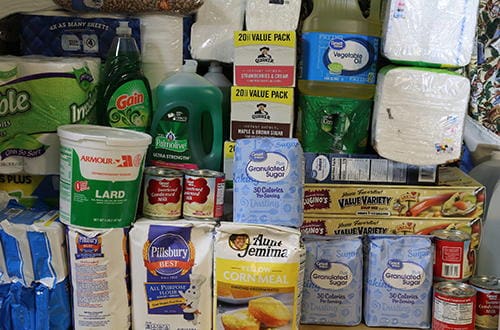
Arranging Appropriate Shelter For Your Livestock
Our pioneers understood that winter didn’t just affect humans, but it also had an impact on animals. Thus, they ensured to provide a safe, comfortable, and warm place for their livestock.
First of all, to protect them from the cold, our ancestors arranged well-ventilated barns and coops.
Additionally, to make their livestock feel warm, they would provide them with cozy beds made of haystacks.
Related: How To Keep Your Livestock Safe In Bad Winter Weather
Stocking Up On Firewood
My great-grandmother always emphasized the importance of year-round timber storage to prepare for freezing nights. This advice motivated me to stock up on firewood from time to time.
If you have some spare space on your farm, you can put it up to good use for storing this essential. However, make sure the space is moisture-free to protect the wood from damage.
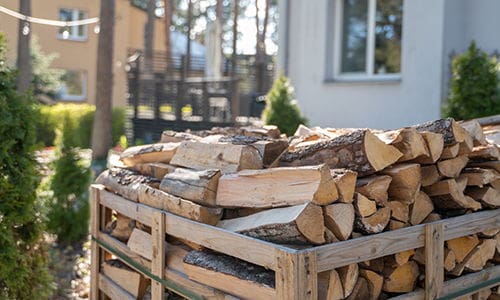
Wearing Proper Layerings For Protection From Cold
Dressing in layers is a simple yet effective strategy for staying warm during winter, a practice our pioneers relied on.
You can use moisture-wicking clothing as a base layer, add an insulated vest for warmth, and finally finish with a waterproof and windproof outer layer. This approach keeps you cozy while working outdoors in cold conditions.
Gathering Emergency Supplies Before Winter
Our pioneers were proactive in gathering emergency supplies even before the onset of cold weather.
We should also follow in their footsteps by creating emergency kits to prepare ourselves for unexpected challenges accompanied by winters. It’s wise to stock up on essential medicines and ointments with extended shelf lives so they remain effective for a long period.
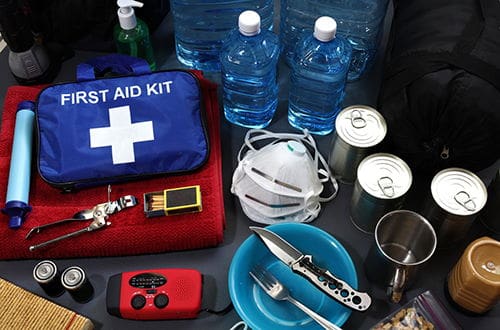
Socializing With the Community
Our pioneers used to socialize with communities during the winter to help each other with basic chores. This also allowed them to share and learn valuable tips from their fellow homesteaders.
While we may have modern technology to bridge distances, the essence of coming together physically still stands out. Whether it’s a simple dinner or a group effort to clear snow from the roads, these interactions hold a community together.
So don’t forget to hit up on your neighbor farmsteaders during the harsh winters!
Related: Are You A Community Member Or A Lone Wolf?
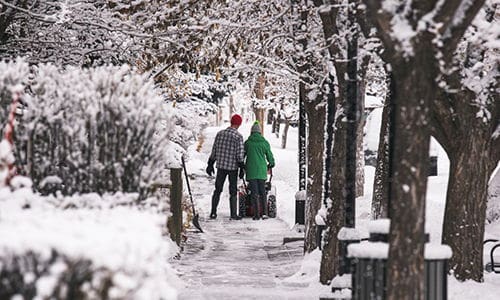
Protecting Your Farmstead By Installing Saplings
Winters bring piercing cold and, of course, howling winds. Thankfully, the pioneers had a brilliant way of dealing with them! I remember my great-grandfather telling me stories about how fierce the winter winds would be, wrecking their farmstead.
To fight this natural force, pioneers had a clever strategy to deal with this destruction: planting saplings all across their homesteads. This not only shielded their crops and livestock from the harsh winds but also helped safeguard their property.
When I started with my farmstead, I remembered the lesson my forefather gave me. Since I never wanted to break the bank by investing in expensive fences, I sowed saplings around my farmstead.
Trust me, fellows, you won’t find a better way to reduce wind chill on your homestead than this.
Melting Snow To Make Drinking Water
Locating fresh water during winter presented yet another challenge, as the once-accessible ponds and lakes would freeze. Our ancestors would resort to melting fresh snow beside their campfires and bottling it for later consumption.
You can also use this approach by gathering clean, freshly fallen snow and melting it to obtain drinking water. To maximize this method, I often placed containers outside to catch falling snow. Later, I’d melt it by the campfire to produce fresh, clean drinking water.
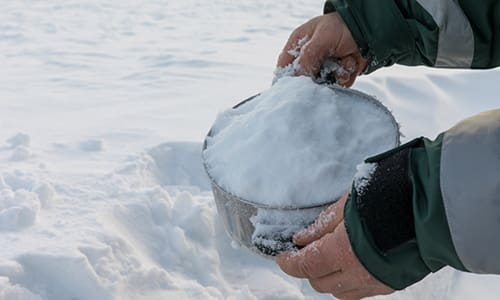
Building Ice Houses To Use As Natural Refrigerators
Winters often consist of frequent power outages, so storing frozen eatables can become a difficult task. But worry not, because our pioneers have left a valuable strategy for us: using ice houses as natural refrigerators.
The easiest way is to make cubes out of the snow and create tiny igloo houses. That’s it! Your natural refrigerator is ready to store food.
Gathering Necessary Tools For Removing Snow
In the older times, removing snow was a hectic chore. Since there were no specialized machines, our pioneers had to rely on manual tools to scrape snow. For this reason, they would always stock up their homestead with sleds, shovels, and plows even before winter settled in.
I guess all of you would have these tools in your yard, but if you don’t have one, make sure to get them now. You can dedicate a small corner for storing these tools in your barn to access them more easily.
Bottom Line
To sum it up, surviving in winter doesn’t have to be challenging. By following in the footsteps of our ancestors, we can not only survive the cold weather but also find joy in it.
Whether it’s insulating your home or making your livestock cozy and comfortable, these strategies can make a world of difference. With some solid suggestions from our pioneers, you can turn your homestead into a cozy haven all winter.
Stay warm, stay safe, and enjoy the season!
You may also like:
100+ Long Lasting Foods that Can be Stored Without Refrigeration (Video)
10 Things To Do To Winter-Proof Your Home
How To Build a Solar Heater from BEER cans for FREE
How I Lived With No Fridge And No Heat For The Last 5 Years
8 Common Mistakes Most People Make When Preparing For Winter
